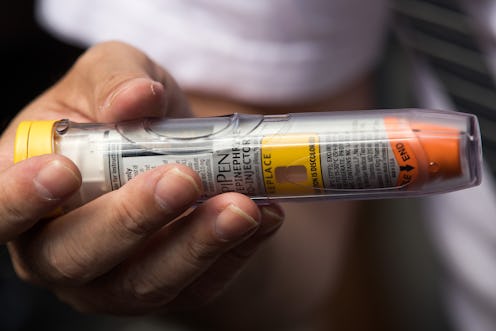Life
The FDA Says There’s A Shortage Of EpiPens In The U.S. & Here’s What You Should Know

Heads up, folks with allergies: The U.S. Food and Drug Administration (FDA) has officially added Mylan EpiPen Auto-Injectors to its list of drugs in shortage, the FDA announced May 9. Mylan is experiencing manufacturing delays that are straining its ability to consistently produce EpiPens (0.3 mg) and related products, including EpiPen Jr (0.15 mg), and generic versions that Mylan produces, according to CNN.
CNN reported that in a statement, Mylan said it is experiencing "intermittent supply constraints," but that "product is available and Mylan is currently receiving continual supply from its manufacturing partner Meridian Medical Technologies." USA TODAY noted that Mylan told the FDA about the shortage "several months ago" and that the company has been keeping the FDA in the know since then.
For those not in the know, EpiPens "are common auto-injectors typically used to counter allergic reactions to certain foods, such as nuts, bee or insect stings, or anaphylactic shock, a potentially life-threatening reaction to a foreign substance," according to USA TODAY.
FDA spokeswoman Lauren Smith Dyer told CNN that the FDA expects the shortage to be "short-term." But of course, if you or a loved one rely on EpiPens to be a readily available emergency treatment, hearing that there's a shortage, even one expected to be short-lived, can be frightening. According to Business Insider, Mylan said it is "expediting shipment to wholesalers upon receipt, and supply levels may vary across wholesalers and pharmacies." Mylan spokeswoman Lauren C. Kashtan told CNN the company is getting ahead of the shortage by "successfully [locating] alternative pharmacies for patients who are experiencing difficulty in accessing product," and Mylan encourages patients who are struggling to find EpiPen products to contact Mylan's customer relations line, CNN reported.
According to Business Insider, Mylan CEO Heather Bresch "downplayed the impact of the shortage and the inclusion on the FDA's list of drug shortages on a quarterly earnings call on Wednesday," saying, "Ironically, they have to put that on their shortage list to say there's not a shortage."
It may relieve some of your stress to know that according to The New York Times, other countries have been successfully dealing with the shortage for at least a couple of months. The Times reported that Mylan began warning about shortages in Britain two months ago, and that Canada has also been affected. The Times also reported that charities in areas that have already been experiencing the shortage "said there were anecdotal reports of some patients having difficulty filling prescriptions but there did not appear to be major supply issues overall, thanks to the availability of rival products."
Smith Dyer told CNN that the FDA will be posting a list of epinephrine auto-injector products that are produced by companies other than Mylan, "as well as contact information for consumers and health care providers."
For folks who need epinephrine and are currently having trouble accessing EpiPens, Spencer Williamson, president and CEO of pharmaceutical company Kaléo, told CNN that patients "with either commercial insurance or no insurance and a household income lower than $100,000" will be able to access Kaléo's competing product, AUVI-Q, "for $0 out of pocket," and that AUVI-Q is available through Kaléo's direct delivery service.
If you are having trouble filling a prescription for an EpiPen or believe you may have trouble in the future, your first step should be reaching out to your healthcare provider to see if they have a stopgap workaround that will allow you to access a product, even if it's not a brand-name EpiPen. You can also reach out to Mylan at (800) 796-9526 to talk directly to the company about locating brand-name EpiPens.